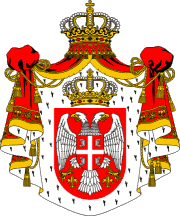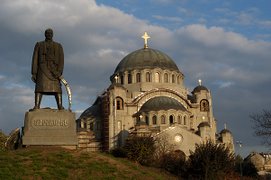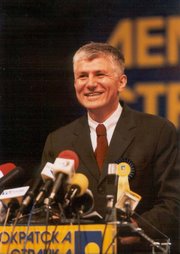Zoran Djindjic
Balkanska pravila (Balkan Rules)
http://www.youtube.com/watch?v=ZU9-vd_sNsk
Ako stane... (If it stops...)
http://www.youtube.com/watch?v=QjPCSGPTNMI
A Little Bit of everything...
Balkanska pravila (Balkan Rules)
http://www.youtube.com/watch?v=ZU9-vd_sNsk
Ako stane... (If it stops...)
http://www.youtube.com/watch?v=QjPCSGPTNMI
Posted by
sharper.image
at
3:04 AM
0
comments
![]()
Posted by
sharper.image
at
2:22 AM
0
comments
![]()
Posted by
sharper.image
at
11:14 PM
1 comments
![]()
Profesor i odbojkaš Dejan Ilić (48) je doktor nauka, a kao vanredni profesor predaje na nekoliko svetskih univerziteta, senator je u Evropskom privrednom senatu, jedini je Srbin redovni član Akademije nauka u Njujorku.
Pre tri godine dobio je nagradu za životno delo Svetskog udruženja hemičara u SAD.
Osim u svoju suprugu, ćerkicu, fizičku hemiju, Smederevo i Selevac, dr Dejan Ilić zaljubljen je i u odbojku. Prvi put zaigrao je sa 16 godina, a od Crvene zvezde stigao je do francuskog Medona i nemačkog Drezdena. I danas igra.
'Ja sam čovek seljak. Ovde trošim energiju na fizičke poslove, zidam, okopavam, volim da vozim traktor u zamašćenim pantalonama. Napajam vijuge za nove ideje.'-ovako govori prof. dr Dejan Ilić, jedan od najuspešnijih Srba u dijaspori, doskora direktor nemačke firme „Varta-mikrobateri“, a odskora prvi čovek kompanije za proizvodnju filmskih uređaja ARRI AG u Minhenu. 'U selu se stalno nešto radi. Pomažem komšijama ako šta treba da se ponese, ozida. Sadim i orezujem ruže, traktorišem', kaže čovek koji je izumeo prvu evropsku litijumsku bateriju za pejsmejker i izazvao revoluciju u svetu mini baterija. Za bateriju za slušni aparat marke „power one“, dr Ilić dobio je drugu svetsku nagradu za dizajn.
Prošle godine je bio proglašen jednim od 20 najboljih menadžera na svetu. U konkurenciji 1.000 najbriljantnijih mozgova, dr Ilić bio je jedini kome je mesto rođenja u Srbiji.
'Angažman u ARRI AG, najstarijoj kompaniji na svetu za proizvodnju filmskih uređaja, izazov je koji se ne odbija. Fizička hemija i spektroskopija su moja ljubav. Mogućnost da kreirate novi digitalni svet dobije se jednom u radnom veku. Pripremamo se za izradu novog čipa za 3D tehnologiju, što je prvi korak ka digitalizovanom bioskopu', objašnjava dr Ilić okupljenima u seoskoj kafani.
Kaže da je novi posao prihvatio i zato što je Minhen u poređenju s Elvagenom, 200 kilometara bliži Selevcu.
----------------------------
23 Januar 2007
Dejan Ilić, direktor „Varta mikrobaterije”, dobitnik je svetske nagrade za inovacije u kategoriji srednjih preduzeća, koja mu je dodeljena tokom vikenda na svečanosti u poznatoj frankfurtskoj zgradi „Alte opera”.
Ovu nagradu Dejan Ilić dobio je za izum prve polimer baterije u svetu, ugrađene u najnovijem MP3 plejeru, poznatog proizvođača „Epl”.
„Reč je o izumu koji je poznata američka firma ugradila u svoj minijaturni MP3 plejer zahvaljujući kome su njihove akcije na tržištu porasle za osam do devet odsto, a akcije celog tržišta elektronike na kraju su zbog toga porasle za četiri odsto.
´Varta mikrobaterija´ na ovom projektu uradila je da baterija za ovaj MP3 plejer može na sebi da ima tri mikročipa, zatim da komunicira sa čitavom elektronikom, a ceo trik bio je u tome da izumemo bateriju koja će da se puni dok korisnik skida muziku sa kompjutera, u čemu smo i uspeli”, izjavio je Dejan Ilić, direktor „Varta mikrobaterije”.
Po njegovim rečima, ovaj MP3 plejer, koji se na tržištu SAD prodaje po ceni od 499 dolara, ne samo da može da skida muziku i isto vreme puni bateriju već korisniku pruža i slušanje muzike od 20 sati, a baterije se mogu puniti čak 1.000 puta.
„Varta mikrobaterija” je već prodala pet miliona baterija za ova uređaj, a u celom svetu „Epl” će u masovnu prodaju MP3 plejer pustiti već od aprila ove godine.
I pre nego što je u subotu dobio nagradu, ceo hol „Alte opere” odavao je utisak da će baš Dejan Ilić dobiti ovu prestižnu nagradu.
Naime, u „Alte operi” mogli su se videti panoi tri firme koje su dobile nagrade u svojim kategorijama, a između ostalog tu je bio i pano „Varta mikrobaterije”, koji je prikazivao baterije za minijaturni MP3 plejer.
„Mislim da su Nemci bili u šoku kad su čuli da je jedan Srbin dobio nagradu za inovaciju, a ova nagrada za Srbiju znači mnogo. Pre svega, Dejan Ilić otvara vrata mnogim poznatim kompanijama u Nemačkoj, a on je, kao veliki patriota, spreman da pomogne svojoj zemlji”, izjavio je Ognjen Pribićević, ambasador Srbije u Berlinu. Može se reći da je sa ovom nagradom Dejan Ilić na krovu sveta, jer je ovo samo jedna u nizu nagrada koje je Ilić dobio. Prošle godine u Monte Karlu bio je proglašen za najboljeg menadžera u svetu. (Blic)
Posted by
sharper.image
at
3:17 AM
1 comments
![]()
Prema kanonu SPC, praznik Svetog Ilije obeležen je „crvenim slovom”.
On, kako se veruje, upravlja munjama i gromovima.
Predanje kaže da je Ilija sin Savahov iz plemena Aronovog, brata Mojsijevog rođen 816. godine pre Hrista u Tesvitu, pa mu je nadimak Tesvićanin.
„Kada se Ilija rodi, njegov otac Savah vide angele Božje kako dete ognjem povijaju i daju mu plamen da jede”, zapisano je u „Prologu” vladike Nikolaja Velimirovića.
Vladika Nikolaj je pisao o plamenom karakteru svetitelja, borcu za pravu veru i protiv razvrata i nemorala, koji je vladao u jevrejskom narodu u vreme cara Ahaava i carice Jezavelje.
Prema starozavetnom predanju, Sveti Ilija nije umro, već se palenim kočijama vazneo na nebo, pa se ovaj prizor najčešće slika na pravoslavnim ikonama koje se iznose pred oltar na praznik Ilindan.
Mnoga narodna verovanja vezana su za svetog Iliju Gromovnika, a običaj je da se na njegov praznik ne radi u polju, da se ne bi navukao gnev svetitelja.
Veruje se da Sveti Ilija„komanduje” gromovima, dok se za njegovu stariju sestru Ognjenu Mariju (30. jul) veruje da upravlja ognjem, a njegova mlađa sestra Marija, čiji se praznik obeležava u avgustu, zove se Blaga.
Kad grom udara, onda kažu da Sveti Ilija, po zapovesti Božijoj, gađa đavole, pa kad grom pogodi u drvo, niko ga ne seče, čak ni za ogrev.
Oko Ilindana su često nesnosne žege, čuvene ilinjske vrućine, ali kada taj svetac mine, žege opadaju i dolaze svežije noći, pa otud i izreka: „Sveti Ilija, vatra sve milija” ili „Od Svetog Ilije, sunce sve milije”.
Posted by
sharper.image
at
2:44 AM
0
comments
![]()
 Britanski naučnik Isak Njutn, otac moderne fizike i astronomije, u pismu iz 1704. godine predvideo je kraj sveta za 2060. godinu.
Britanski naučnik Isak Njutn, otac moderne fizike i astronomije, u pismu iz 1704. godine predvideo je kraj sveta za 2060. godinu.
Njegovo pismo juče je izloženo u Hebrejskom univerzitetu u Jerusalimu u sklopu izložbe pod nazivom „Njutnove tajne”.
Čuveni racionalista, koji je kraljevskim izuzećem pošteđen zaređenja u engleskoj crkvi - što je bilo uobičajeno za akademika njegovog doba i zbog čega nije morao slediti njeno učenje - ipak je zasnovao svoje predviđanje na Biblijskom tekstu.
Njutn je utvrdio je da će svet nestati 1260. godina posle osnivanja rimske imperije u zapadnoj Evropi 800. godine naše ere.
Sa Univerziteta je saopšteno da je pismo prvi put javno izloženo od 1969. godine.
Njutnov rad krajem 17. veka na Univerzitetu Kembridž bio je kamen temeljac moderne nauke do otkrića relativiteta i kvantne mehanike u prošlom veku. Međutim, već je dugo poznato da se ovaj istaknuti fizičar iz engleskog mesta Grentama interesovao za alhemiju koje moderna nauka nije prihvatila.
Njutn je četiri godine proveo u pripremi rada iz alhemije.
Posted by
sharper.image
at
8:19 AM
0
comments
![]()

Bivši direktor Federalnih rezervi SAD kaže da je obezbeđenje nafte bilo suštinsko u svrgavanju Sadama Huseina.
Alan Grinspen tvrdi da je zvaničnicima Bele kuće pre pokretanja rata u Iraku rekao da je svrgavanje Sadama Huseina suštinsko u obezbeđivanju naftnih rezervi.
Upitan da li ima razloga za zadovoljstvo što je lider Iraka Sadam Husein uklonjen sa vlasti, Grinspen je odgovorio da je to „bilo od suštinskog značaja”.
U svojoj knjizi „Doba turbulencija: Avanture u Novom svetu”, Grinspan piše da mu je „žao što je politički nezgodno priznati ono što svi znaju, a to je da je rat u Iraku uglavnom vođen zbog nafte”. Međutim, kako ističe Vašington post, Grinspanova najveća podrška za zbacivanje Huseina sa vlasti bila je ekonomske prirode. „Mislim da je Sadam Husein jasno stavio do znanja, imajući u vidu 30 godina dugu istoriju, da je bio blizu preuzimanja kontrole u moreuzu Hormuz, kuda dnevno prođe 17, 18 ili 19 miliona barela nafte”, objašava Grinspan i dodaje da je zbog toga rekao da je „od suštinskog značaja” bilo svrgavanje bivšeg iračkog lidera.
Grinspen je sa dužnosti prvog čoveka Federalnih rezervi otišao početkom 2006, posle 18 godina na čelu te institucije.
Posted by
sharper.image
at
7:18 AM
0
comments
![]()
 " The life of your father is just like a lamp before the wind." - Lieutenant General Tadamichi Kuribayashi, in a letter to his son.
" The life of your father is just like a lamp before the wind." - Lieutenant General Tadamichi Kuribayashi, in a letter to his son.
Kuribayashi, who had advocated against banzai attacks at the commencement of the battle, began to realize that Japanese defeat was imminent.
It has been said that Kuribayashi himself led this final assault which unlike the loud banzai charge of previous battles, was characterised as a 'silent' attack.
If ever proven true, Kuribayashi will have been the highest ranking Japanese officer to ever personally lead an attack during World War II.
Additionally, this would also be Kuribayashi's final act of departure from the normal practice of the commanding Japanese officers committing seppuku behind the lines while the rest perished in the banzai charge, as happened during the battles of Saipan and Okinawa.
Posted by
sharper.image
at
2:43 AM
1 comments
![]()
Posted by
sharper.image
at
5:27 AM
66
comments
![]()




